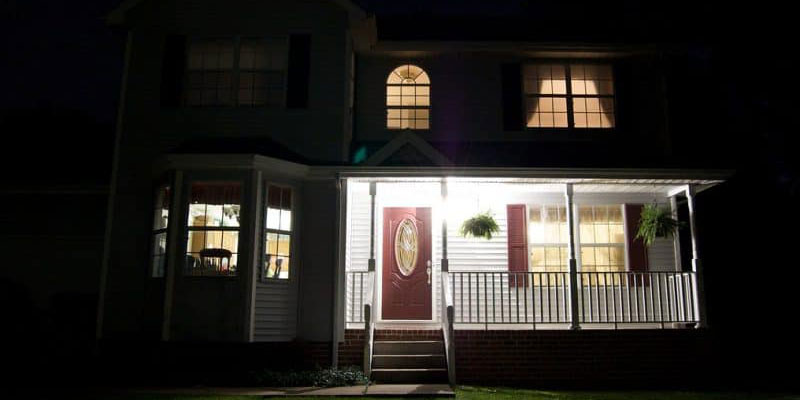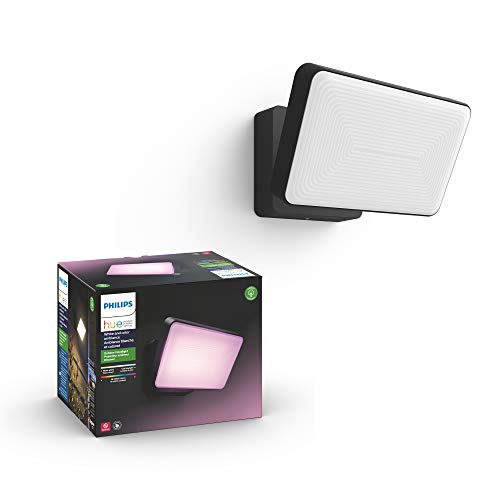As an Amazon affiliate, I earn from qualifying purchases.
In this blog post, I’ll review the seven best smart outdoor lights to brighten your home and yard. From porch lights to garden accents to path lights, my goal is to help you find the perfect picks for your setup.
The Best Smart Outdoor Lights for You
 Smart lights rule. I was an early adopter of smart light bulbs, and now nearly every bulb in my home is connected to voice commands and my smartphone app. But smart lighting isn’t just for inside anymore-there are amazing options for your outdoor space too.
Smart lights rule. I was an early adopter of smart light bulbs, and now nearly every bulb in my home is connected to voice commands and my smartphone app. But smart lighting isn’t just for inside anymore-there are amazing options for your outdoor space too.
From solar panel-powered lights to smart string lights that create cozy vibes, smart features like voice control, color temperature adjustments, and integration with Google Assistant or the Ring app make outdoor use easier than ever. You can even customize different colors right from your mobile app or the Govee app, all linked to your home network for extra peace of mind.
According to Outdoor Lighting Market Size & Trends by Grand View Research, there are over 750 million outdoor lighting fixtures worldwide, and a staggering amount of energy is wasted every year. Upgrading to the best smart outdoor lights is a good option for improving energy efficiency, saving money, and bringing peace of mind to your outdoor spaces.
Stick around, and I’ll share my top picks to light up your space in style. From smart outdoor lighting with rope lights and bollard lights to white bulbs for clean brightness, there’s something for every setup. I’ll cover the best options and top picks, including remote control features and different color choices to fit your vibe.
Types of Smart Outdoor Lights
When picking the best smart outdoor lights, consider how advanced features and smart lighting kits can enhance your space while keeping energy consumption low. Options include:
- Smart Porch Lights – Ideal for entryways and porches using smart bulbs or stylish lanterns. Top pick: Philips Hue Inara or upgrade to Philips Hue Econic.
- Smart Floodlights – Bright, motion-activated lights that improve security and visibility. Top pick: Ring Floodlight Camera, or for just lighting, Philips Hue Discover.
- Smart Path & Landscape Lights – Light up walkways and gardens while reducing energy consumption. Top pick: Philips Hue Calla Pathway Light.
- Smart Spotlights – Highlight architectural details or outdoor features with focused beams. Top pick: Philips Hue Lily.
- Smart Switches – Control existing outdoor light fixtures remotely without changing bulbs. Top pick: TP-Link Kasa Smart Switch.
Best Smart Outdoor Lights: Comparison Table
Use this quick table to compare the best smart outdoor lights at a glance. I’ve listed my personal picks, the best use cases, and what makes each option stand out.










Last update on 04/16/2025 / Affiliate links / Images from Amazon Product Advertising API
Next, I’ll go through each option to help you determine which smart outdoor lights will work best for your home and yard.
📚 Related: 11 Wicked Smart Home Yard Ideas for Outside
Smart Porch Lights
If you have an enclosed porch, smart bulbs like Philips Hue lights or LIFX bulbs work great for easy control and energy savings. They fit into your existing fixtures and let you set schedules by time of day for better energy usage.
For open porches exposed to the elements, go with outdoor smart lights designed for weather resistance and smart home integration. These fixtures add both convenience and style while syncing with your broader smart home systems.
Here are the two I recommend.
Philips Hue Inara
The Philips Hue Inara is a great pick if you want a classic lantern look with smart features baked in. I recently installed this outside my apartment, and it just works great. I have it on a schedule, so I just set it and forget it.
It offers warm white light, easy scheduling, and integrates seamlessly into your existing Hue setup. I love that it feels like a traditional fixture but works perfectly with smart home gadgets like Alexa and Google Assistant.
One thing to note: with a maximum lumen output of 800 lumens, it’s bright enough for most porches, but not as powerful as some floodlight options.
A weatherproof smart wall light with full color control for year-round outdoor style.
Philips Hue Econic
For more brightness and extra versatility, the Hue Econic is my top choice. It delivers bright white light and full color options so you can adjust the vibe depending on the season or occasion.
This smart fixture works outdoors year-round, handling inclement weather with ease. You can mount it as either a ceiling light or wall fixture, giving you flexible installation options to suit your space.
With gradient tools and easy integration into your smart home ecosystem, Econic adds style and serious function to your porch setup.
A colorful smart pathway light to brighten your walkways with low-voltage convenience.
Smart Floodlights
Next on my list of the best smart outdoor lights is a smart floodlight that will crank up your home security.
A floodlight does exactly what it sounds like. It floods a certain area with light. These are great theft deterrent as you can have them kick on when they detect motion.
Perfect for the front, back, and side yards, these cast a wide beam of light – usually around 45 degrees.
Some of the smart floodlights even come with cameras making it a great anti-theft tool.
Here’s the floodlight I personally recommend for full coverage and peace of mind.
Ring Floodlight Camera
The Ring Floodlight Camera is probably the most popular smart floodlight on the market. It combines powerful motion-activated lighting with a built-in HD camera, two-way talk, and a siren alarm.
You can control it with Amazon Alexa, turning the lights on or launching real-time video with your voice. It also sends instant alerts to your phone and starts recording as soon as motion is detected – giving you full visibility and control from your phone, tablet, or PC.
A motion-activated floodlight with HD camera and two-way talk for home security.
This video from TechHive gives a nice overview of this product.
Philips Hue Discover
The Philips Hue Discover is a great alternative to the Ring Floodlight if you’re looking for straightforward security lighting without the higher price tag. While it doesn’t include a camera or alarm, it covers the basics well with bright, motion-activated floodlighting.
You’ll also get full-color control with 16 million shades of light, so it works just as well for ambient outdoor lighting as it does for home security. Install it around your home’s perimeter to boost visibility and set the mood.
Like most Philips Hue lights, the Discover requires a Hue Hub for operation. Once connected, it becomes part of the larger Hue ecosystem, giving you full control through the Hue app and voice assistants. And yes, it looks pretty great too.
A color-changing outdoor floodlight that boosts both your home security and style.
Smart Path and Landscape Lighting
Outdoor path lighting isn’t just for show – it’s surprisingly practical. Pathway lights can brighten your front and rear walkways, making it safer to navigate, especially if you’re like me and tend to trip over things in the dark.
Beyond safety, these lights make great accents for patios, pools, and other outdoor living spaces. Plus, they integrate smoothly into your smart home systems to manage energy usage and scheduling.
Philips Hue Calla
The Philips Hue Calla is one of my top choices for landscape lighting. These fixtures work well along walkways, around the patio, or even by the pool for stylish, functional illumination.
They require the Hue Hub to operate, but it’s a solid investment since you can expand your setup with other Hue bulbs and fixtures. Bonus: you can even sync them to your favorite music using an app for a fun, dynamic light show.
If you are interested in learning more about Calla lights, check out this post I wrote comparing Philips Hue Calla vs Lily [with more video reviews].
These are the two best smart outdoor lights you can buy in my humble option.
A stylish smart pathway light with customizable colors for safer, brighter outdoor spaces.
Thanks to Shelly from Best Buy Canada Product Videos for the helpful video review:
Smart Outdoor Spotlights
Spotlights add a sharp touch to your landscape, perfect for highlighting features like trees, garden paths, or outdoor walls. They’re great for casting bright white light or colorful beams to showcase parts of your yard.
My buddy recently installed one to light up an American flag tapestry on the side of his house – it looks awesome at night and really makes the display pop.
Philips Hue Lily
He’s using the Philips Hue Lily Spot Light, one of the most popular choices for smart outdoor spotlights. It’s part of the wider Hue ecosystem, meaning you can sync it with your other smart home systems and control everything from the app.
While it does require a Hue Hub, the setup is super easy. You can adjust brightness, switch between vibrant colors, or set schedules to manage energy usage and match your preferred vibe for any time of day.
For a closer look, check out my full comparison of Hue Calla vs Hue Lily.
A smart spotlight kit for highlighting trees, walls, and outdoor features in full color.
Smart Outdoor LED Strip Lights
For flexible, creative outdoor lighting, Hue LED strips are a great option. Think of them like outdoor-safe rope lights you can shape around your front porch, patios, or pathways to add style and visibility.
Part of the Hue ecosystem, these strips connect to your smart home systems and let you set schedules, adjust brightness, and control your lighting through the app. They’re available in two sizes – 2m and 5m – giving you options for different setups and DIY options.
According to Market Research Future, the outdoor LED strip market is set to more than triple by 2034, driven by the rise of smart cities and the growing demand for smart lighting solutions. Weather-resistant and built to last, these sets of lights work perfectly alongside smart outdoor string lights to create layered, ambient effects.
Hue LEDs
The Philips Hue Outdoor Lightstrip delivers serious flexibility for outdoor lighting. Use it along railings, wrap it around fences, or line your front porch to create a smooth, continuous glow without visible hotspots.
You’ll need the Hue Bridge, but that unlocks full control through the app, letting you automate brightness, colors, and schedules. Available in 2m and 5m lengths, it’s a solid pick for everything from subtle accent lighting to more dramatic effects.
If you want to see them in action, Erin Lawrence has an excellent video showing how these strips perform outdoors and how they hold up over time.
Like most Hue lights, the outdoor strip requires a Philips Hue Bridge to unlock full control. Once connected, you can automate schedules, adjust colors and brightness, and sync it with your smart home ecosystem.
Right now, the outdoor strip is available in a 7-foot (2m) size, making it a versatile option for patios, railings, or garden paths.
Flexible smart light strip for railings, porches, and garden accents with millions of colors.
Smart Switches
Last on my list of the best smart outdoor lights is something that’s surprisingly underrated: the smart switch. Instead of swapping out all your bulbs, you can control your existing fixtures at the switch level.
For outdoor setups, this is a great option – especially if you already have traditional light bulbs or wired sets of lights. While I’d recommend hiring an electrician for safety, confident DIYers might find installation manageable with the right precautions.
TP-Link Kasa
The TP-Link Kasa smart Wi-Fi light switch is my top pick for a smart switch. It’s reliable, works with Alexa and Google Assistant, and doesn’t require a hub – making it a budget-friendly way to automate your outdoor lighting.
It functions just like your regular wall switch but adds extra features like scheduling and voice control. You can set your outdoor lights to follow your daily routine or turn them on remotely, improving both your user experience and energy efficiency.
The setup is straightforward, and TP-Link has a handy video that walks you through installation step by step. Lots of users swear by these switches for their reliability and ease of use, making them a smart upgrade for any outdoor lighting setup.
A simple smart switch that lets you control existing outdoor fixtures with ease.
Here’s a nice video from the manufacturer that shows you how to install and set up a TP-Link switch.
Final Thoughts on the Best Smart Outdoor Lights
The best smart outdoor lights give you complete control over your outdoor areas, whether you’re brightening a pathway with durable bulbs or using rope lights and spot lights to create a warm glow. For year-round style, smart fixtures like ceiling lights, holiday lights, and cafe lights bring vibrant colors and flexibility to your setup.
Trusted brands like Philips Hue and LIFX deliver great value and weather-resistant materials, making them the best option for lasting performance in inclement weather. Many options work seamlessly with Apple HomeKit and Alexa-enabled devices, letting you automate lighting for specific times of day or match your daily routine.
If you found this helpful, don’t miss my in-depth comparison of Philips Hue Calla vs Lily for your outdoor smart lighting setup. And if you’re planning future projects, pin this guide to Pinterest so you can easily reference it later!
📚 Read Next: Philips Hue Calla vs Lily

Tim Brennan, a tech blogger and host of the @TecTimmy YouTube channel, writes about smart homes at oneSmartcrib, home theaters at UniversalRemoteReviews, and AI in writing at Writeinteractive. He holds a Journalism degree from Northeastern University and has covered technology for three decades. He lives on the ocean in Nahant, Massachusetts.
Please subscribe to my YouTube channel for a fun take on all things tech.











